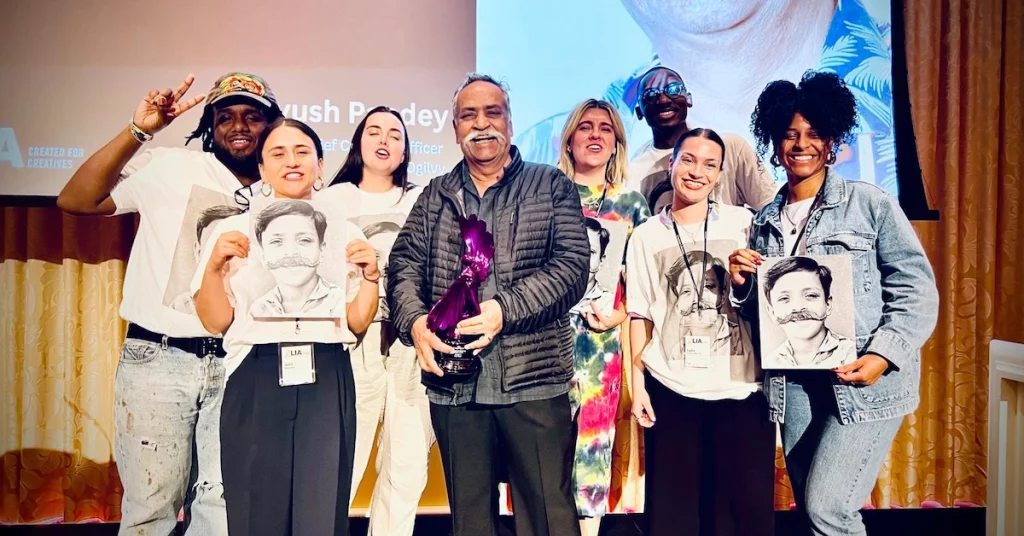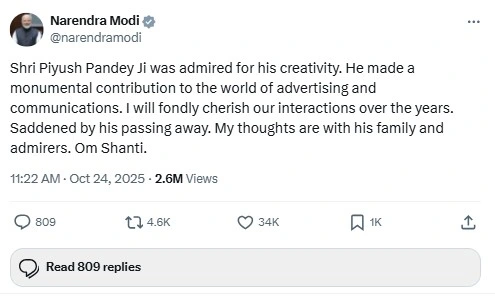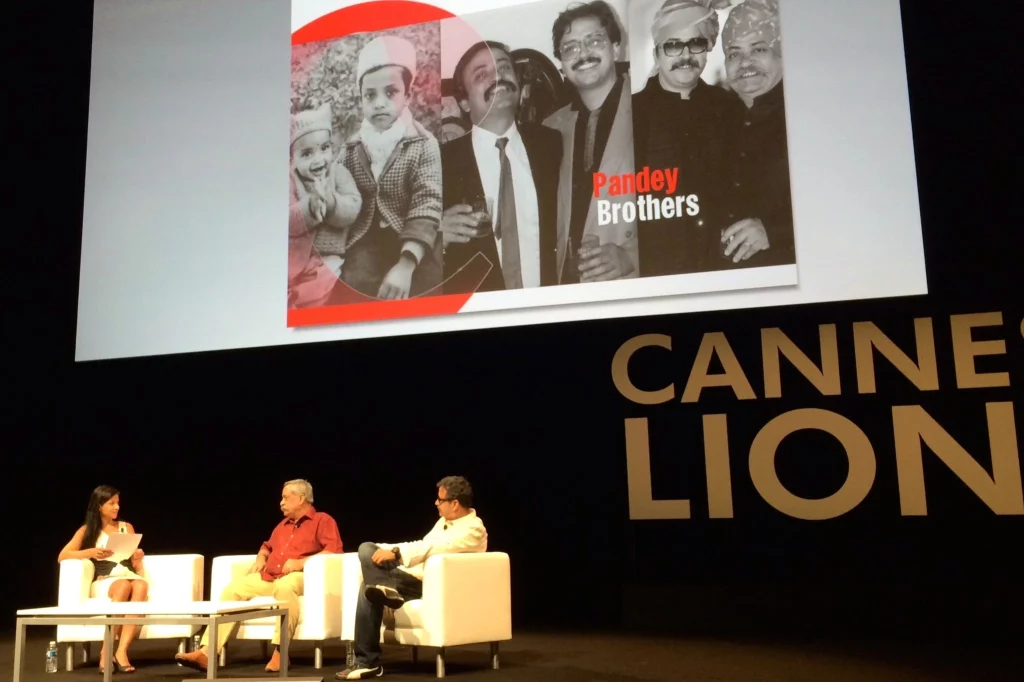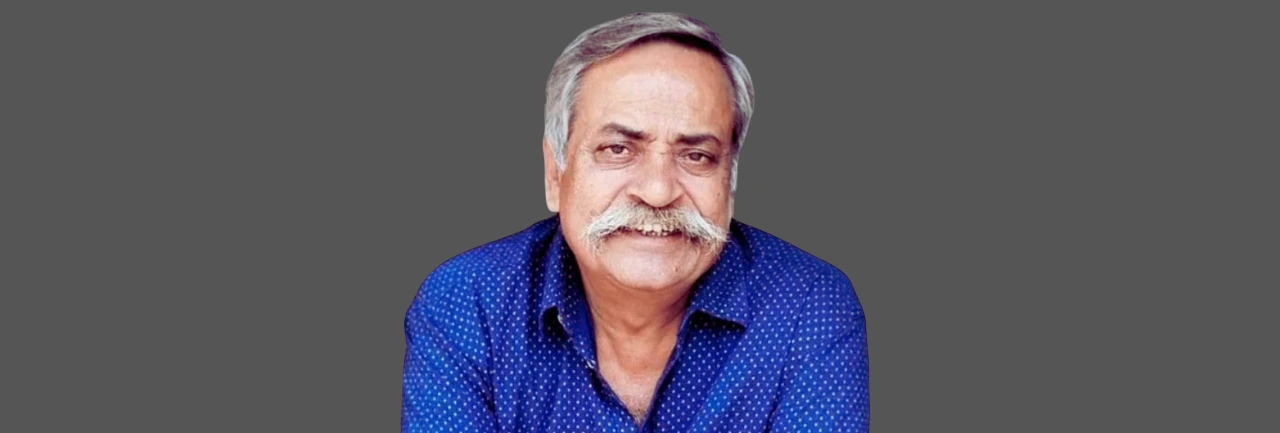(October 26, 2025) Indian advertising was evolving, but Piyush Pandey gave it a voice that felt unmistakably its own, grounded in everyday India yet resonant across the world. Through his work, it discovered a language that was earthy, emotional, and deeply human. His leadership and mentorship went on to shape generations of creatives, influencing campaigns, awards, and storytelling philosophies both at home and abroad.
When the global advertising fraternity gathered each year on the French Riviera for the Cannes Lions Festival, there was always one unmistakable figure in the crowd with the sweeping moustache, the booming laugh, and the eyes that saw stories where others saw slogans. Piyush Pandey, who passed away on October 23, 2025, at 70, was not only one of India’s most celebrated creative minds but also one of the acclaimed storytellers. He taught multinational brands to speak with the warmth of human conversation and gave Indian advertising a seat at the world table.

Piyush Pandey after winning the honour of LIA Legend at the London International Awards 2024
In a career that spanned more than four decades, Pandey transformed the language of marketing. As Worldwide Chief Creative Officer of Ogilvy (2019) and Executive Chairman, India, he bridged continents and cultures, showing that emotion travels farther than English and that the local, told truthfully, can become universal. Honors like the Clio Lifetime Achievement Award (2012), the Lions of St Mark (2018) shared with his brother Prasoon Pandey, the LIA Legend Award (2024), and India’s Padma Shri (2016) followed. Yet to those who knew him, the greater legacy was his insistence that “engagement is the key to communication.”
The foundation of a storyteller
Born in Jaipur in 1955 into a household of nine children, Pandey grew up surrounded by art and argument. His sister, Ila Arun, sang folk songs; his brother Prasoon would later direct award-winning commercials. Their father worked with the Rajasthan State Co-operative Bank and took young Piyush along on trips to small towns. These were the encounters that became lessons in humanity. “That’s where I learned advertising,” he later said. “On trains, in markets, watching how people talk and trade, how they laugh at themselves.”
Educated at St Xavier’s School, Jaipur, and St Stephen’s College, Delhi, he studied history but lived cricket. Playing for Rajasthan in the Ranji Trophy, he learned discipline, patience, and teamwork. These were virtues that would later shape his leadership at Ogilvy. Before advertising, he worked briefly as a tea taster, training his senses to detect subtle notes, a metaphor, perhaps, for the attentiveness that defined his craft.

Building Ogilvy, building India’s voice
Pandey joined Ogilvy & Mather in 1982 as a client-servicing executive. His first ad, which was the print ad for Sunlight Detergent, marked the beginning of an advertising revolution. Within six years he switched to creative, crafting work that sounded nothing like the Westernized jingles of the time. “I wasn’t trying to imitate Madison Avenue,” he once quipped. “I was trying to sound like India — noisy, emotional, and wise.”
From Fevicol’s unbreakable glue to Cadbury Dairy Milk’s dance of joy, from Asian Paints’ “Har Ghar Kuch Kehta Hai” to Vodafone’s pug and ZooZoos, Pandey created campaigns that blurred the line between advertising and folk memory. Under his stewardship, Ogilvy India became the country’s creative powerhouse, ranked No. 1 agency for twelve consecutive years in The Economic Times Agency Reckoner.
When he was promoted to the Worldwide Board of Ogilvy in 2006 and later to Worldwide Chief Creative Officer, it was not just his promotion but a recognition that India had become a creative exporter. Pandey carried his Jaipur sensibility into boardrooms in New York, London, and São Paulo, reminding global clients that authentic emotion outperforms algorithmic precision.
Indianization of Ogilvy’s soul
When Ogilvy’s leadership announced Pandey’s elevation to Worldwide CCO in 2019, global media hailed it as “the Indianization of Ogilvy’s soul.” He became both ambassador and teacher, travelling between New York, London, and Mumbai, mentoring creative teams from Berlin to Johannesburg. “Don’t worry about the British or the Japanese,” he told them. “Touch hearts. That’s the only universal language.”
He resisted the obsession with metrics. “You reach a million people, but how many did you move?” he would ask. For him, advertising was not a decibel war but a conversation. His philosophy foreshadowed today’s shift toward authenticity in global branding, and the same insight that powers purpose-driven marketing from São Paulo to Stockholm.
Learning from life, not from data
Despite heading one of the world’s most data-driven agencies, Pandey distrusted creative by spreadsheet. “You can have data,” he said, “but it can’t replace life.” His own “training on wheels,” as he described his railway journeys across India, taught him more about consumer behaviour than any focus group could.
He believed that humour was a higher form of empathy and that “laughter in the corridor” was the truest measure of an agency’s health. With former chairman Anand Halve, he used to joke that success at Ogilvy was measured not in revenue but in decibels of joy.

Brothers Piyush and Prasoon Pandey were honoured at the Cannes Lions International Festival of Creativity
Mentor, listener, lifelong learner
Even after stepping down as Executive Chairman in 2023 to become Chief Advisor, Pandey spent his days mentoring young founders and creative leaders. In a podcast, he gently reminded new-age entrepreneurs that “brands are built by love, not loudness.” He was as curious about start-ups and memes as he was about the early days of print ads.
His humility made him accessible; his laughter made him unforgettable. To a generation raised on instant virality, he preached patience. “Long-term is about happiness,” he said. “If you love your work, results will follow. The Fevicol bus didn’t travel overnight. It’s been running for thirty years.”
Books, art, and a life beyond awards
Pandey chronicled his journey in “Pandeymonium” (2015) and “Open House with Piyush Pandey” (2022) which was part memoir, part manifesto. He acted briefly in Madras Café and appeared in ICICI Bank’s Magic Pencil Project. Yet the theatre he loved most was the one inside the Indian imagination. For him it was a space where a good line could make an entire nation smile.
He penned the lyrics for Mile Sur Mera Tumhara, the iconic national integration anthem celebrating India’s unity in diversity, and also co-wrote the screenplay for the film Bhopal Express. Awards never defined him. He often said the real trophies were “shopkeepers who quote my lines and kids who hum my jingles.”
Making Indian creativity lead the way
What Piyush Pandey achieved was more than professional success; it was cultural diplomacy. He proved that Indian creativity could lead, not follow, and that warmth and wit could travel better than accent and jargon. In doing so, he helped dismantle the hierarchy of global advertising, turning India from a production outpost into a creative nerve center.
As the advertising world mourns his passing, his philosophy feels more urgent than ever. In an era obsessed with algorithms, Pandey’s humanism is the counterpoint: “Don’t just reach people,” he said, “touch them.”
The man who made emotion a global language
At heart, Piyush Pandey was still that boy from Jaipur, the cricketer who travelled unreserved across India, collecting stories like match tickets. He never forgot that the best ads were like those train conversations: brief, warm, and true.
His legacy is like an echo in every agency that seeks authenticity over artifice, in every brand that dares to speak like a friend, and in every young creative who believes that ideas, like glue, can hold the world together. Piyush Pandey proved one timeless truth that when stories are told from the heart, they speak every language on earth.
Pandey’s portfolio reads like the cultural history of modern India. Notable campaigns include:
- Fevicol & Fevikwik — Ads such as “Fevicol Bus” and “Todo Nahin, Jodo” turned adhesive into metaphor, humour into loyalty.
- Cadbury Dairy Milk — The girl dancing on the cricket field became shorthand for uninhibited happiness; later campaigns shifted to generosity and gratitude.
- Asian Paints — Homes became storytellers; colour turned emotional.
- Vodafone — The pug that never left your side symbolized friendship in the mobile age, and the ZooZoos became global pop icons.
- Public campaigns — The anti-smoking ad for the Cancer Patients Aid Association won double Gold at Cannes; the polio drive with Amitabh Bachchan changed behavior; “Bell Bajao” challenged domestic violence; and the Google “Reunion” film melted borders.
- Politics and tourism — From “Ab ki Baar Modi Sarkar” to Gujarat Tourism’s cinematic series, his work shaped national conversations.
ALSO READ: Remembering T. T. Jagannathan of Prestige, the visionary who made Indian cooking safer



